
Occupy Central
Occupy Central is a civil disobedience movement which began in Hong Kong on September 28, 2014. It calls on thousands of protesters to block roads and paralyse Hong Kong's financial district if the Beijing and Hong Kong governments do not agree to implement universal suffrage for the chief executive election in 2017 and the Legislative Council elections in 2020 according to "international standards." The movement was initiated by Benny Tai Yiu-ting (戴耀廷), an associate professor of law at the University of Hong Kong, in January 2013.

Umbrella Movement
The Umbrella Movement (Chinese: 雨傘運動; pinyin: yǔsǎn yùndòng) is a loose political movement that was created spontaneously during the Hong Kong protests of 2014.[2] Its name derives from the recognition of the umbrella as a symbol of defiance and resistance against the Hong Kong government, and the united grass-roots objection to the decision of the Standing Committee of the National People's Congress (NPCSC) of 31 August.
The movement consists of individuals numbering in the tens of thousands who participated in the protests that began on 28 September 2014, although Scholarism, the Hong Kong Federation of Students, Occupy Central with Love and Peace, groups are principally driving the demands for the rescission of the NPCSC decision.
The movement consists of individuals numbering in the tens of thousands who participated in the protests that began on 28 September 2014, although Scholarism, the Hong Kong Federation of Students, Occupy Central with Love and Peace, groups are principally driving the demands for the rescission of the NPCSC decision.
OCCUPY CENTRAL - DAY 76: Full coverage of the day’s events
Click to View
MULTIMEDIA: Tracing the moments of Occupy in Hong Kong's streets
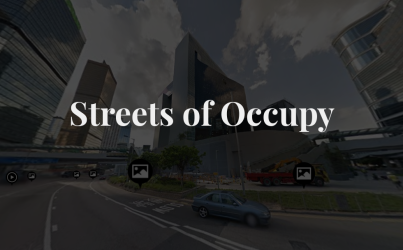
Hong Kong's “Umbrella Movement” lost its major stage on Thursday with the police clearance of the main protest site in Admiralty. With this immersive multimedia, we take you to the places where history was made in the last 75 days.
Umbrella Folds: before and after photos of Hong Kong's main Occupy camp
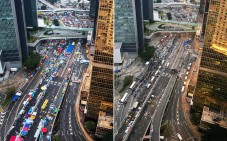
Umbrella Folds: before and after photos of Hong Kong's main Occupy camp
Police cleared a key pro-democracy encampment on December 11, 2014 - 74 days after the movement started. Protesters rushed to save all they could - pieces of history - hours before the operation. Before its demise, the camp in Admiralty had grown into a mini-community, surrounded by artworks, books, music and a hunger for change.
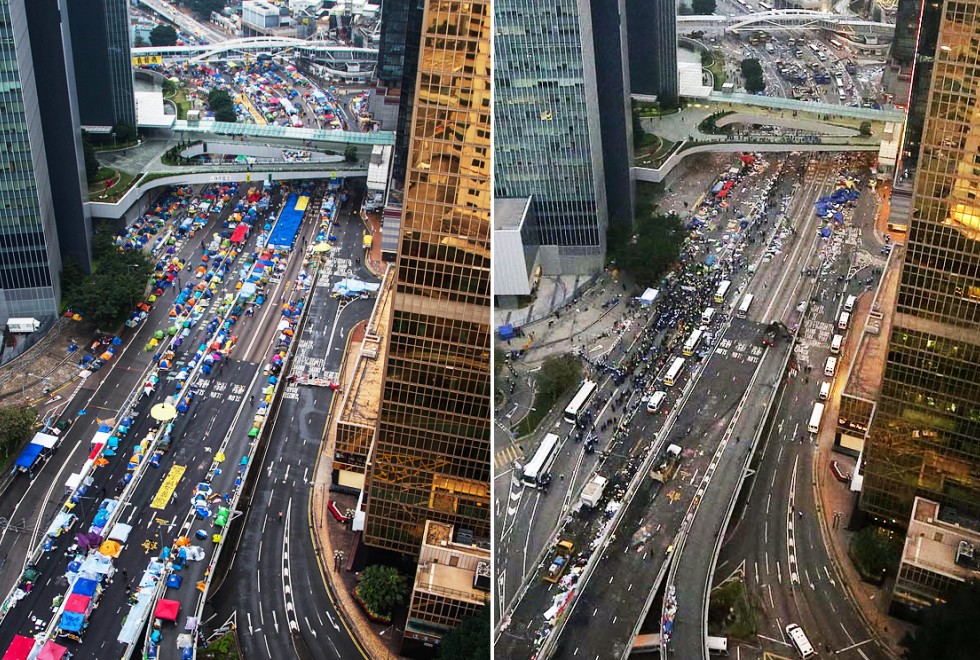
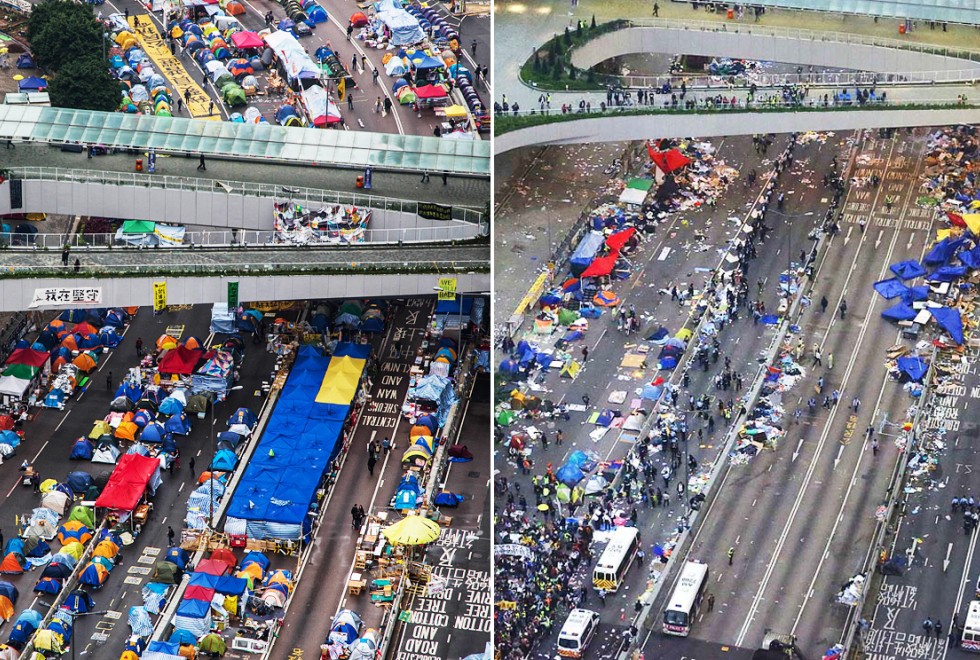
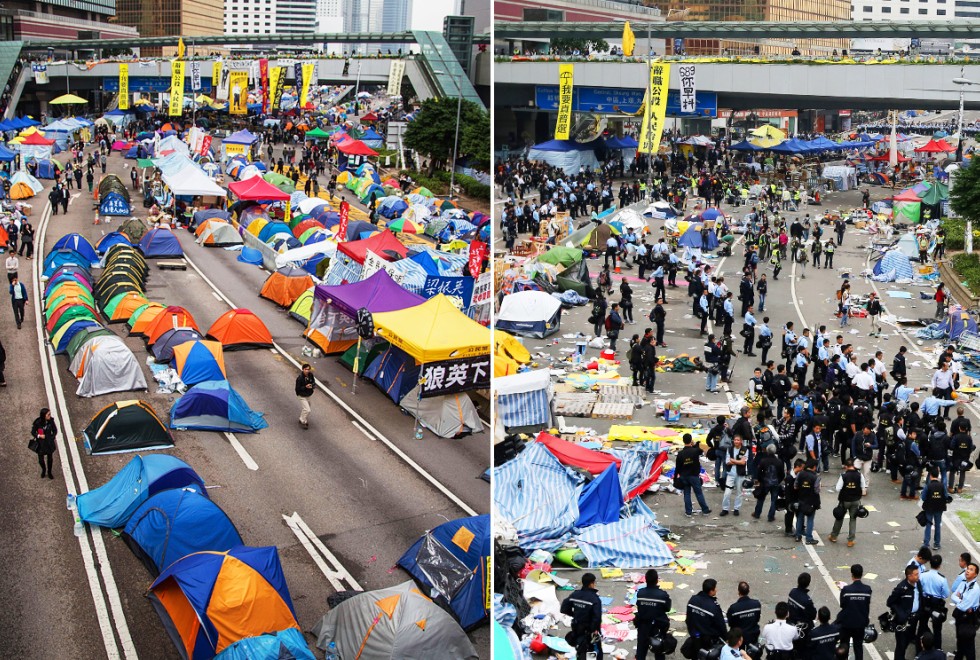
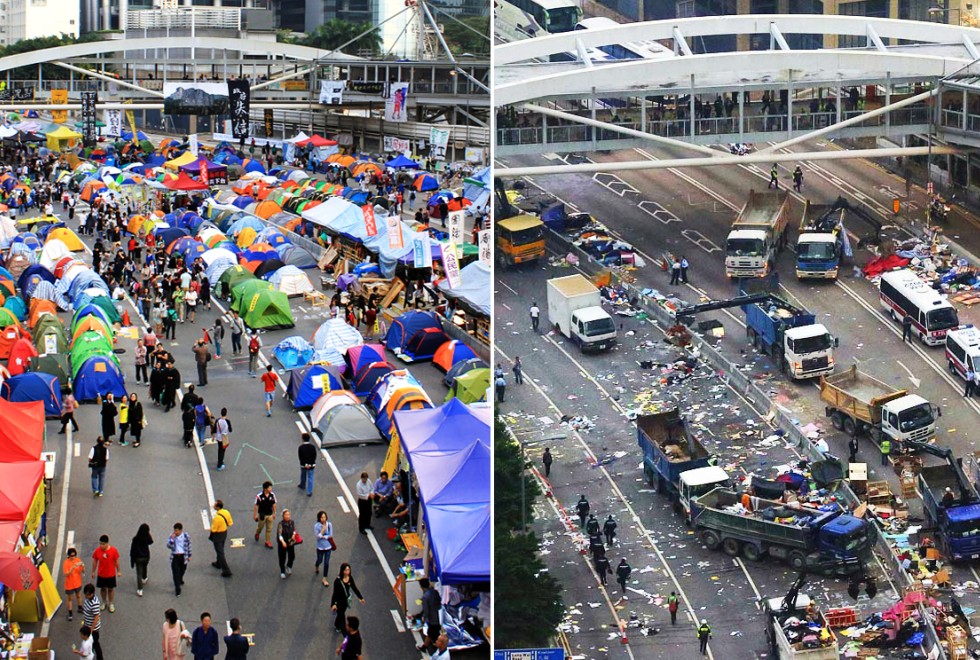
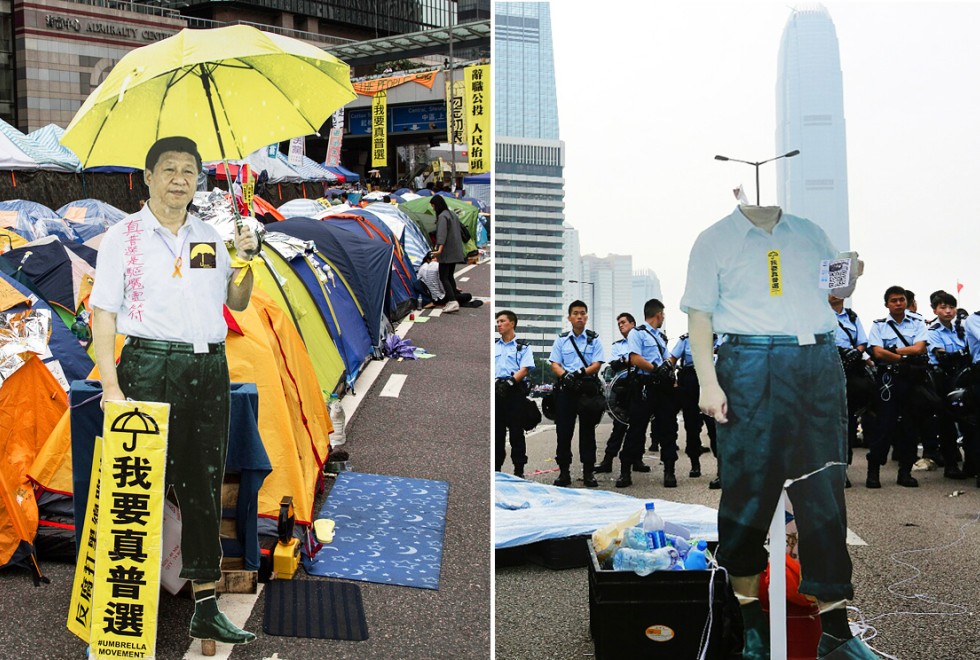
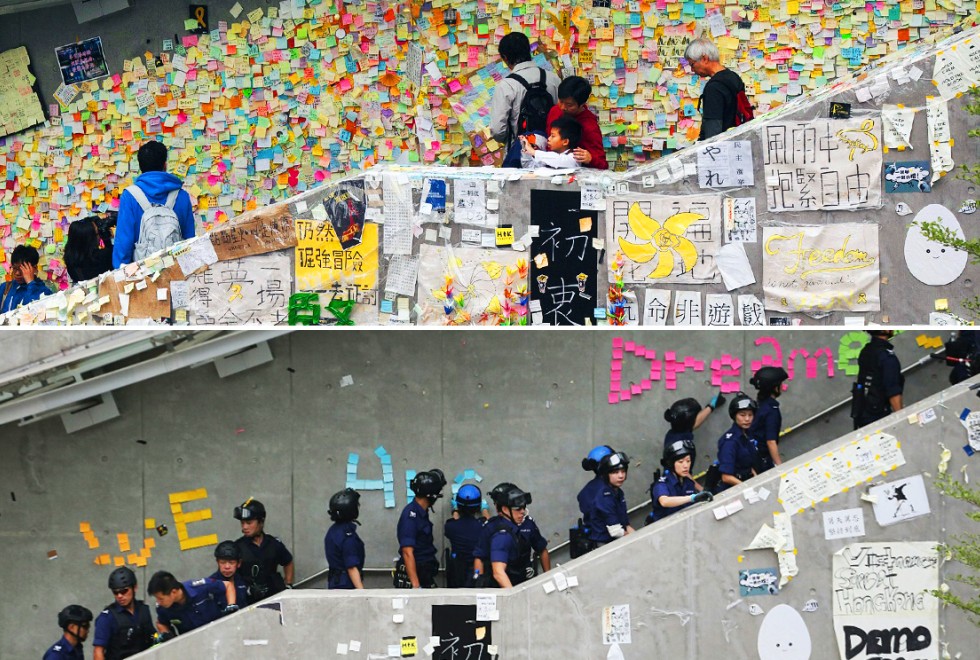
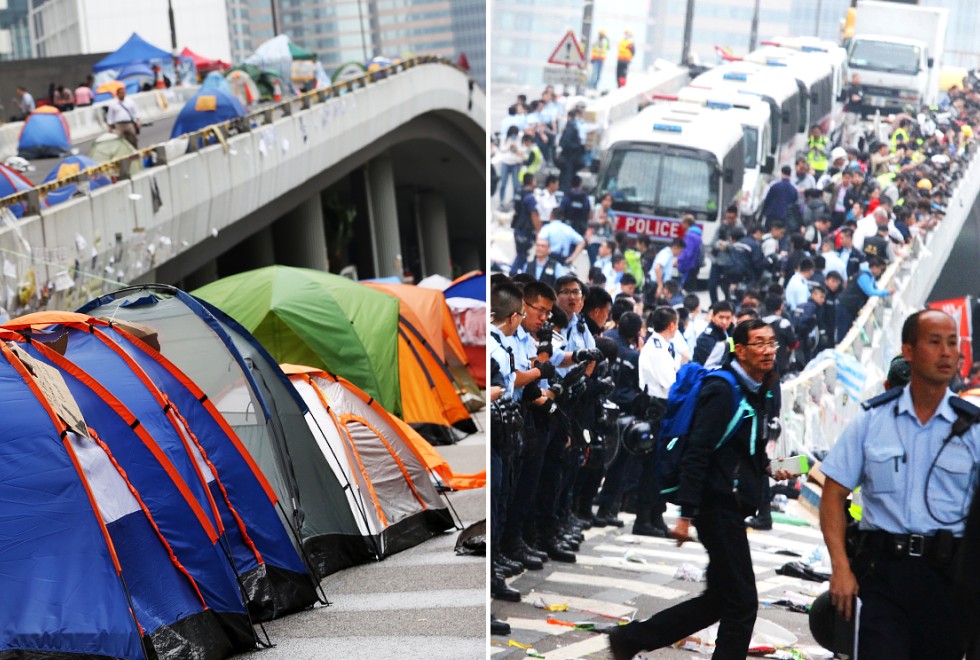
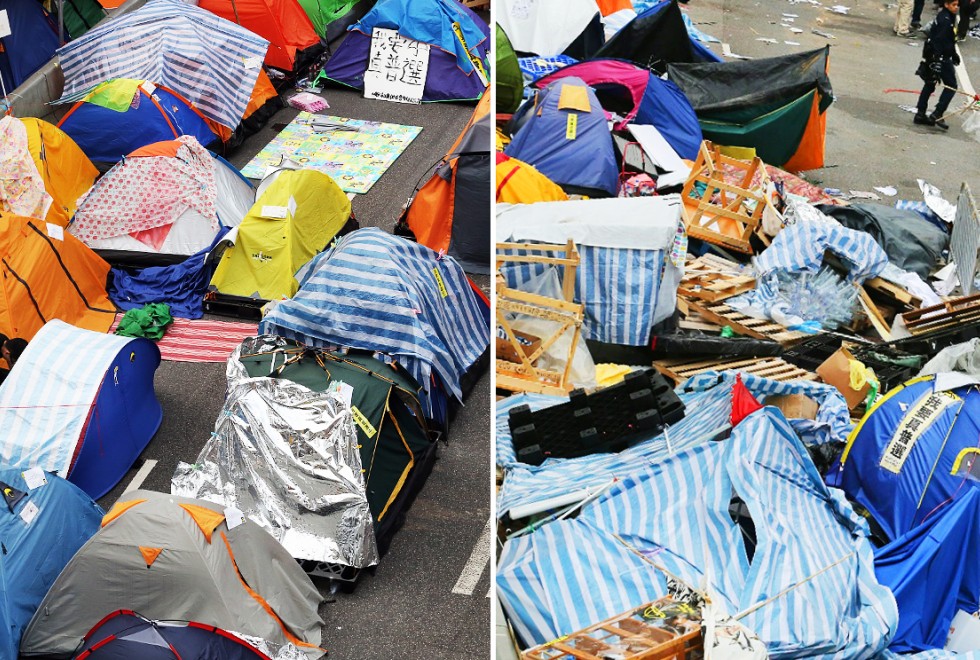
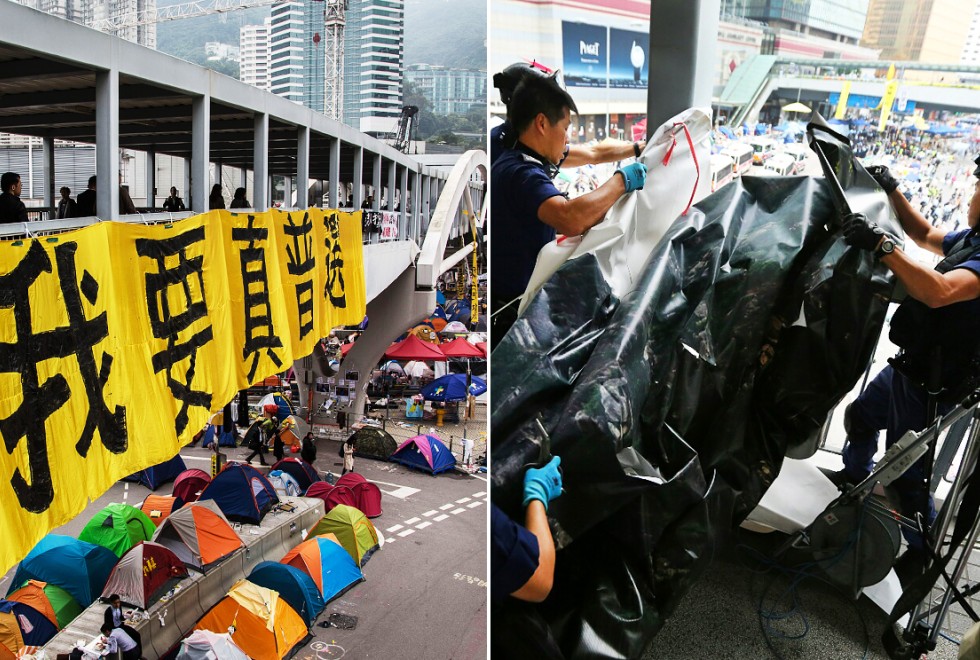
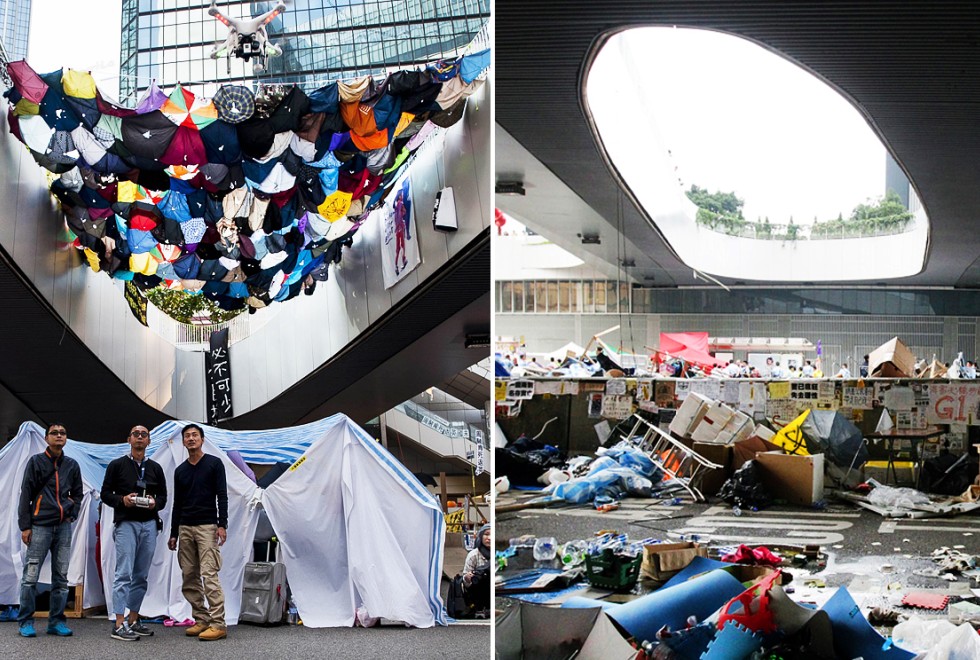
Occupy Central camp in Admiralty goes down quietly as police move in
No resistance as workers backed by 7,000 police clear out community that lasted 75 days, and hardcore protesters wait patiently to be arrested
PUBLISHED : Friday, 12 December, 2014, 2:51am
The occupied site in Admiralty was cleared without resistance or any visible scuffles yesterday in a police operation that was described by a watchdog as "smooth and peaceful".
Last night, authorities were still working to return blocked roads to the way they were in late September before the "umbrella movement" for democracy erupted.
The colourful tents that once lined Harcourt Road - the busiest in the city centre - the creative banners and artworks that enlivened the space, the assorted chairs and beds, and the people who were behind it all - were gone after a day-long operation by police and bailiffs.
Among items torn down was a banner newly erected on road barriers that read: "It's just the beginning". Protesters released balloons lifting a banner that read: "We'll be back".
Unlike the first clearance of Occupy, launched in Mong Kok last month, the Admiralty operation went ahead without brawls or bloodshed.
As many as 7,000 police officers were reportedly deployed yesterday.
Chief Secretary Carrie Lam Cheng Yuet-ngor praised the police action for its "high-level transparency" that would avoid any "misunderstanding" or "smearing".
Lam Tai-fai, lawmaker and vice-chairman of the Independent Police Complaints Council, also said the peaceful turn of events meant a "soft landing" for the end of the Occupy action.
"[We saw] no clashes, not even verbal arguments between police and protesters," he said. "Overall, it was peaceful and all had been restrained. We are glad to see the way it ended."
Lawmaker Helena Wong Pik-wan, who was in Admiralty with Lam Tai-fai from 8am, also said she felt protesters were given enough time to pack and leave.
But arrests of protesters who refused to budge did not end until 9.10pm. A total of 247 people were arrested.
Many had pledged to take full responsibility for their civil disobedience in the fight for democracy. Seven hours before the arrests began at 4.20pm, all were already seated calmly, chatting and laughing with one another from time to time.
The first to be arrested was believed to be a female student. Female officers read her the legal rights before carrying her away.
Political heavyweights Martin Lee Chu-ming and Audrey Eu Yuet-mee also lingered around for the arrests, as did celebrity singer Denise Ho Wan-see, pan-democratic lawmakers and student leaders.
Ho led the crowd in chanting: "Civil disobedience, we are fearless!" Unlike the other people arrested, she refused to be lifted off her feet, walking instead to a police car with two officers amid cheers from the crowd.
The clearance ended the 75-day lifespan of a vibrant community equipped with a supply station, study area, workshop and first-aid centre.
The operation started officially at 9am, when about 50 workers, several bailiffs and lawyer Paul Tse Wai-chun - representing company All China Express - descended on the site and notified protesters about their enforcement of a High Court injunction granted to the cross-border bus operator.
Tse warned protesters that resistance would leave them liable to contempt of court.
The workers then started the demolition process, breaking the cement that glued barriers to the road surface at four locations.
It took much longer than expected for the bailiffs to finish clearing the areas covered by the court order - Connaught Road Central, Harcourt Road and Cotton Tree Drive - by which time it was about 1pm.
Police then took charge of clearing the remaining four-fifths of the occupied site.
Senior superintendent Patrick Kwok Pak-chung issued an ultimatum for the remaining occupiers to leave before officers sealed off the area - from the Academy for Performing Arts to Connaught Road Central next to the Hong Kong Club - at 2.20pm.
More than 900 people who left voluntarily after that time - via a designated exit at Tim Mei Avenue - had to give their personal details to police for possible prosecution later.
At 2.20pm, uniformed officers began to march towards the core occupied area of Harcourt Road from the directions of Wan Chai, Central and Tim Mei Avenue. None of the men were heavily equipped, except for a special squad tasked with dismantling the more complicated barriers.
The only resistance they met was from a man who refused to budge from the Harcourt Road flyover. He was arrested and his hands bound with plastic ties.
Everything that the protesters once treasured, but was in the way of the officers, was eventually crane-lifted onto trucks. At one point last night, at least 10 trucks were working to remove the materials.
Police toppled a three-metre-long yellow umbrella installation - the symbol of the movement - and used saws and cutters to break it up into pieces.
And in just a few minutes, a supply station and workshop that was once covered by another yellow umbrella was reduced to a pile of debris.
As the officers walked towards the bridge next to the Admiralty Centre, they shoved aside abandoned tents, upturned desks and chairs and threw away anything left unattended.
Samuel Chan, Phila Siu, Emily Tsang, Elizabeth Cheung, Alan Yu and Danny Lee
How a newspaper commentary unfolded into months of protest
2013
January 16 University of Hong Kong legal scholar Benny Tai Yiu-ting raises idea of Occupy Central civil disobedience in newspaper commentary
March 27 Tai, the Reverend Chu Yiu-ming of Chai Wan Baptist Church and Dr Chan Kin-man of Chinese University release Occupy manifesto
2014
June 20-29 Occupy holds "referendum" on three election models, all backing public nomination in 2017 chief executive poll
August 31 National People's Congress Standing Committee lays down framework for 2017 poll that critics say cannot ensure genuine universal suffrage
September 22 Federation of Students starts five-day class boycott
September 26 Student protesters break from rally outside government headquarters in Admiralty and scuffle with police. Scholarism convenor Joshua Wong Chi-fung is arrested
September 28 Tai declares start of Occupy protests. Police lose control of crowds and use 87 rounds of tear gas
September 29 Protesters block key roads in Central, Admiralty, Wan Chai, Causeway Bay and Mong Kok
September 30 Protesters urge Chief Executive Leung Chun-ying to resign
October 3 Scores of anti-Occupy activists storm Mong Kok streets and clash with protesters
October 20 High Court grants injunctions to transport groups and Citic Tower owner, ordering protesters in Mong Kok and parts of Admiralty to leave
October 21 Top officials and federation leaders reach no consensus in meeting to discuss electoral reforms
November 9 President Xi Jinping expresses support for Leung
November 15 Federation leaders' plans to petition state leaders in Beijing fall flat because mainland authorities revoke their re-entry permits
November 18 Masked people smash glass doors of Legislative Council and urge protesters to storm building
November 25 Authorities carry out first large-scale clearance operation, targeting Mong Kok
November 27 Radical protesters return to Mong Kok to stage so-called shopping rallies and clash with police
December 1 Scholarism members start hunger strike
December 3 Occupy's founding trio turn themselves in to police
December 8 Court grants injunction to bus company to remove blockades at Connaught Road Central, Harcourt Road and Cotton Tree Drive
December 11 Authorities conduct large-scale operation to free up Central and Admiralty
This article appeared in the South China Morning Post print edition as Admiralty protest site goes down quietly
List of who's who taken into custody
Barristers and lawmakers stay put until the end to face arrests lasting for almost five hours
PUBLISHED : Friday, 12 December, 2014, 2:51am
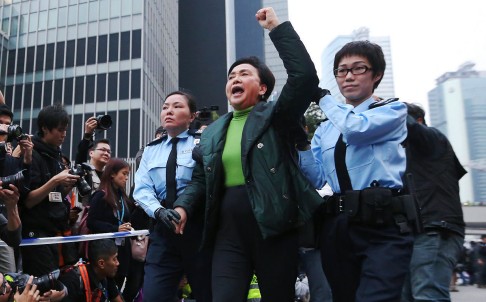
Scores of key players and leaders in the Occupy Central campaign, including former heads of the Bar Association and pan-democratic legislators, were arrested as police moved in to clear the Admiralty base camp yesterday.
Among the big names were media tycoon Jimmy Lai Chee-ying of the Hong Kong-listed Next Media group; "father of democracy" Martin Lee Chu-ming; and Civic Party leader Alan Leong Kah-kit and chairwoman Audrey Eu Yuet-mee. Lee, Leong and Eu had all chaired the city's professional body of barristers before.
Labour Party chairman and lawmaker Lee Cheuk-yan was one of the last arrests, at 9.10pm. Some 247 people were arrested.
The prominent figures, along with other Occupy protesters, were sitting on Harcourt Road in a last-ditch effort to stand up for genuine universal suffrage before the police action began.
They did not resist when officers approached; Lee and Leong even waved to cheering supporters as they were led away.
Lai, known for his critical stance on Beijing, stepped down as the publisher of Next Media subsidiary Apple Daily, the Chinese-language newspaper reported yesterday. He was replaced by Next Media executive director Ip Yut-kin.
Next Media confirmed Lai was taken away by the police, but stressed "the business and operations of the group are and have been operating by a professional management team and not Mr Lai alone … This incident will not affect the normal and usual course of business of the group."
Also arrested were student activists Alex Chow Yong-kang, Nathan Law Kwun-chung and Eason Chung Yiu-wa of the Federation of Students, which had led the protests since late September.
At least 20 Democratic Party members - including legislators Emily Lau Wai-hing, Albert Ho Chun-yan, James To Kun-sun and Sin Chung-kai - were arrested as well.
A Beijing resident shouted "Down with the Communist Party!" before he was carried away.
Wang Dengyao, 55, said he had also taken part in the 1989 Tiananmen Square student movement, and had entered the city this week to "find out the real situation in Hong Kong".
All the detainees were told they were being arrested on suspicion of obstructing a police officer in the execution of his duty and for taking part in an unlawful assembly.
Most of them were taken to Kwai Chung police station. By 10.30pm, they remained in police custody.
Hours before the police took action in Admiralty, four activists from radical groups were arrested, apparently to prevent them from showing up at the site.
Wong Yeung-tat, 35, of Civic Passion, was arrested on suspicion of "taking part in, convening and organising an unauthorised assembly". The group said on its Facebook page that he was accused of involvement in 59 cases of illegal assembly.
Cheng Kam-moon, 26, of the Student Front, was arrested on suspicion of attending and inciting others to take part in an illegal assembly.
So Ho, 28, an assistant of People Power lawmaker Raymond Chan Chi-chuen, was arrested on suspicion of taking part in an unlawful assembly.
League of Social Democrats vice-chairman Raphael Wong Ho-ming, 26, was arrested on suspicion of attending and inciting others to take part in an illegal gathering. Except for Wong Yeung-tat, the other three were later released on bail.
This article appeared in the South China Morning Post print edition as List of who's who taken into custody
Let's now find a way forward on Hong Kong's political reform
PUBLISHED : Friday, 12 December, 2014, 6:28am
The clearance of Occupy Central was proving a long work in progress last night. Hopefully Hong Kong island's main artery may soon be flowing freely again. But it would be naive to think this would be the end of an extraordinary chapter in our history, or of the social turmoil Occupy unleashed. There are serious issues to be addressed, beginning with political reform. It was good to hear Chief Secretary Carrie Lam Yuet-ngor acknowledge as much, before the bailiffs and the police moved in yesterday. The government must be seen to engage more inclusively with all sectors of society on a range of grievances, or protesters may make good a threat to reoccupy.
No matter how admirable their political aspirations, or how many people sympathise, the way the protesters went about trying to advance them was wrong, and unlawful. Moreover, they will not be met because they fall outside a legal framework under the political reform package approved by Beijing.
However, their grievances embrace widespread dissatisfaction with Hong Kong's governance that goes beyond its current chief executive or political reform. They include economic policies, unaffordable housing, failed education reforms, lack of social mobility for young people, a widening income gap and perceived collusion between officials and property tycoons. In terms of social cohesion, that is a perfect storm of discontent. Many of these problems are now deep-rooted, and not easily solved with measures by the government of the day alone. We need to find better ways to work together as a community.
Political reform, the flashpoint for the protest, has to be the starting point. There is a need to shift the focus back on to how to work out pragmatic proposals within the legal framework that have the best chance of acceptance by lawmakers.
Hong Kong wears scars from Occupy Central that will not heal overnight. The movement has polarised society from families upwards and done nothing for the city's relationship with the mainland. Regrettably the wounds also include damage to Hong Kong's reputation and the rule of law, for which the whole community ultimately pays the price.
Yet there is room to end on a positive note prompted by the city's renown for bouncing back stronger from adversity. If there is something good to come out of this confrontation, it is a sharpened focus and new urgency to engage the whole community in finding a way forward on political reform, and more effective ways to deal with long-standing issues.
This article appeared in the South China Morning Post print edition as Let's now find a way forward
Traffic and order return to Admiralty protest zone, but bus and tram disruptions continue
PUBLISHED : Friday, 12 December, 2014, 7:27am
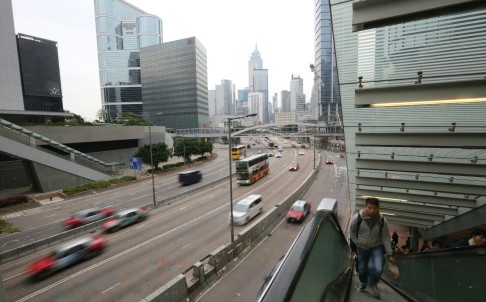
Hong Kong residents frustrated over traffic disruptions and much prolonged commuting time caused by Occupy protesters' roadblocks in the last two and a half months may be in for more disappointment on Friday, even though major roads reopened late Thursday night after the clearance of the main Occupy protest zone in Admiralty.
Many bus lines have resumed normal service, but two serving the Hong Kong Island remain suspended, and dozens of routes continue to be diverted because key road sections in Causeway Bay are still occupied by pro-democracy protesters.
New World First Bus and Citybus said H1 and H2 were still suspended owing to the closure of major roads.
Because of the continued blockage of tram tracks in Causeway Bay, tram service between Percival Street and Paterson Street remains suspended.
The former protest zone in Admiralty is mostly clear on Friday morning. The only remainder of 75 days of protests, debates and clashes are some fragments of posters on the external walls of Admiralty Centre and the footbridge across Connaught Road and Harcourt Road.
Some chalked slogans remain visible on Connaught Road Central, reading "I want true universal suffrage" and "We'll be back."
Traffic on all the roads near the former protest zone appears to be back to normal, with commuters filing in and out of the MTR station exits and bus stops.
One protest camp remains standing at the front entrance to the Legislative Council. Around 30 tents are inside the sheltered area, including the officially designated demonstration zone. Opposite them in an outdoor plaza are around 20 more.
Police officers are seen patrolling the area, and standing guard at various locations including the footbridge connecting Citic Tower and Government Headquarters, Tamar Park and the entrance to the Chief Executive's Office on Lung Wo Road. That entrance is still protected by steel barriers.
Public servants stream into the government headquarters building via the footbridge opposite Citic Tower, under the watch of five security guards with reflective yellow jackets.
The Transport Department has said road sections including Harcourt Road, Connaught Road Central eastbound between Edinburgh Place (western portion) and Harcourt Road, and Connaught Road Central westbound between Jackson Road and Harcourt Road, have been reopened to all traffic.
But Hennessy Road eastbound between Percival Street and Jardine's Bazaar, and Yee Wo Street eastbound between East Point Road and Sugar Street remain closed.
The stairwell that used to be the Lennon Wall is almost stripped bare of posters and notes. A vegetable garden opposite the wall that started in the early days of the protests is also gone, with the soil almost bare.
'Small fixes' not enough to solve Hong Kong's big problems, says Beijing adviser
Leading adviser to Beijing says 'comprehensive treatment' needed to cure Hong Kong's ills - but protest leaders say more action is likely
PUBLISHED : Friday, 12 December, 2014, 12:08pm
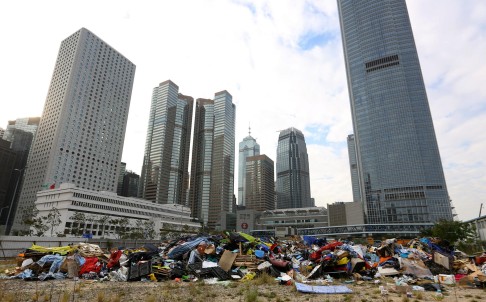
A top adviser to Beijing on Hong Kong affairs yesterday said the city's problems needed "a comprehensive treatment" rather than "small fixes and patches" after the main Occupy Central camp in Admiralty was cleared.
And Chen Zuoer , who heads a high-level think tank created last year to study the city's development, said supplies for the protest camps "worth at least HK$200 to HK$300 million" came from an American organisation "hidden" in a local university. Government figures have long said "external forces" were supporting Occupy, a claim protest leaders vehemently deny.
Chen, a former deputy director of the State Council's Hong Kong and Macau Affairs Office and now chairman of the Chinese Association of Hong Kong and Macau Studies, is the highest profile mainland figure to speak out since the clearance. His remarks, 24 hours after the clearance, came as protesters warned of more actions, which could grow increasingly radical if the desire for equal and universal suffrage was not met.
"All the parties including the opposing party, the 'love the country, love Hong Kong' forces, and all sectors of society have shown their muscle [over Occupy]." This was "a good thing, as it is good for a big treatment to correct the chaos and restore peace. It is not a small fix and patch."
A spokesman for the Hong Kong and Macau Affairs Office meanwhile called for "rational and pragmatic" discussion of the city's political future.
"We hope that Hong Kong's society will … build consensus about its political development within the boundaries of the Basic Law and decisions adopted by the Standing Committee of the National People's Congress," he said. Beijing's framework for the 2017 chief executive election - under which a 1,200-strong committee would pick two or three candidates for the public to choose from - should be followed, the spokesman added.
But leading pro-democracy figures said more protests were likely as the government rolled out a second round of consultation on reform and the reform package was put to the Legislative Council, where pan-democrats have threatened to veto it.
Benny Tai Yiu-ting, a co-founder of Occupy Central, said the end of the encampments did not mean the end of the protests.
"Even if Legco vetoes the government's reform it doesn't solve the problem, and Hong Kong's governance might only worsen," Tai said.
Joshua Wong Chi-fung, convenor of student group Scholarism, said more protests could be held around the government's consultation. But tactics would change in an attempt to win over people keen on democracy but frustrated by street blockades.
Acknowledging that public support had waned, Wong said: "If there are … civil disobedience campaigns in the future, we won't drag them on but will use flexible strategies."
Meanwhile a large pile of broken tents and other rubbish from Admiralty was yesterday seen dumped in a plot on the Central harbourfront. The Food and Environmental Hygiene Department confirmed the detritus was left there on police instructions. Police did not respond to requests for comment last night.
Additional reporting by Jennifer Ngo
This article appeared in the South China Morning Post print edition as 'Small fixes' not enough to solve city's big problems
James Tien sends conciliatory message in dialogue with student leaders
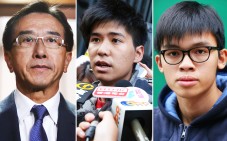
Lawmaker James Tien Pei-chun said he had no qualms about passing Hong Kong to the next generation, in a radio dialogue with student leaders including Scholarism's Oscar Lai Man-lok and Lester Shum of the Hong Kong Federation of Students.
PUBLISHED : Friday, 12 December, 2014, 2:49pm
UPDATED : Friday, 12 December, 2014, 7:59pm
Despite end of Occupy protests, civil disobedience will live on in Hong Kong
Michael Chugani says the end of Occupy has not doused the spirit of civil disobedience in Hong Kong, where the stage is now set for further action
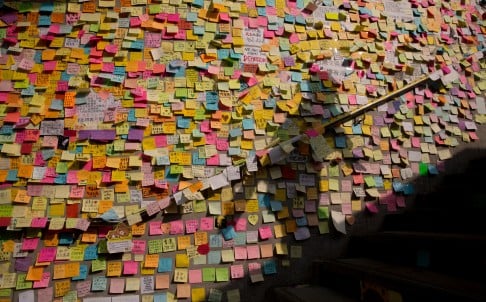
Who won and who lost? That is not a question a community should feel the need to ask itself. If it necessitates asking, then we have all lost. There are no winners in a community at war with itself. Hong Kong has been at war with itself for over 75 days now. Occupy Central's emotional end two days ago will no doubt tempt opposing sides to claim moral victory.
Proponents will hail Occupy as a civil disobedience movement that awakened beyond all expectations awareness among Hong Kong's politically apathetic younger generation. This will breathe new life into the greying democracy movement. Opponents will mock Occupy as an ill-conceived mission that not only failed but radicalised the young, fuelling further mistrust between Hong Kong and Beijing.
The truth lies somewhere in between. More than two months of civil disobedience has brought us no closer to so-called genuine democracy. In fact, it can be argued that Occupy had pushed us even further away from the goal. But it can equally be argued that its demise does not mean the flames that fed it have been extinguished. Civil disobedience is here to stay. The scary thing is that we don't know how it will mutate - peacefully or violently.
It leaves us in politically uncharted terrain. What we saw over the past 75 days has already numbed our senses. Who could even have imagined that our democracy fight would one day produce shocking images of Hongkongers with hard hats, goggles and spiked makeshift shields confronting baton-wielding policemen like two clashing armies? Yet we saw not only that but police tear-gassing protesters, beating up one in a dark corner, protesters kicking a policeman unconscious and radicals smashing the doors of the Legislative Council building.
We used to be appalled by radical legislators hurling bananas at officials in Legco. Thinking back, we can now say that was our age of political innocence. We lost that innocence on September 28. Much as we would like to tell ourselves Occupy was a movement with love and peace, those of us who dare face our conscience know that was not entirely true. There was nothing innocent about the call for protesters to storm government headquarters. I don't know what provoked the police to fire tear gas but something inside me tells me they wouldn't have done so if the protest crowds that day had been wholly innocent.
Occupy thankfully ended without the violence that marked the clearance in Mong Kok. But the realists among us know Occupy was only Act One. What will Act Two be like? I don't dare guess. Occupy architect Benny Tai Yiu-ting wrote in
The New York Times that unless Beijing bows to the demands of the Umbrella Generation - which we know it won't - what awaits us will be fiercer.
The New York Times that unless Beijing bows to the demands of the Umbrella Generation - which we know it won't - what awaits us will be fiercer.
What could be fiercer in the Hong Kong context than spiked shields, bricks and metal barriers used as weapons? Burning cars and petrol bombs? It's too painful even to imagine. Occupy protesters' parting message was that they'll be back. Let's not even think about what awaits us.
Michael Chugani is a columnist and TV show host.mickchug@gmail.com
This article appeared in the South China Morning Post print edition as End of Act One
The source of Hong Kong youth’s frustration
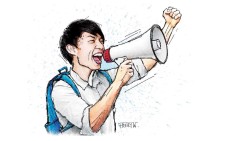
Over the past two months, Hong Kong has witnessed the biggest social movement in its history. Signs showing illustrations of umbrellas, the active participation of youth, and widespread conflict in society have characterised the umbrella movement.
Yet why, exactly, have Hong Kong’s youth stepped up? Why are we angry? What can we do next?
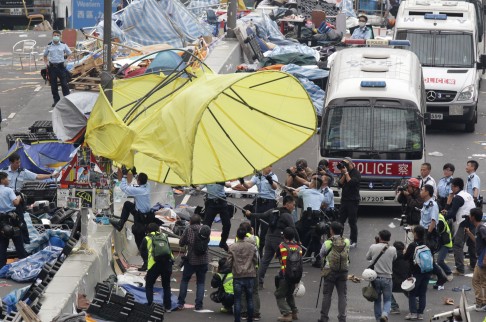
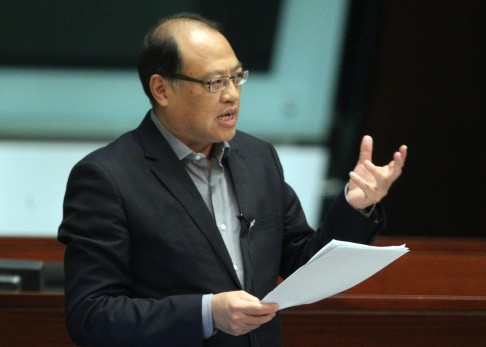
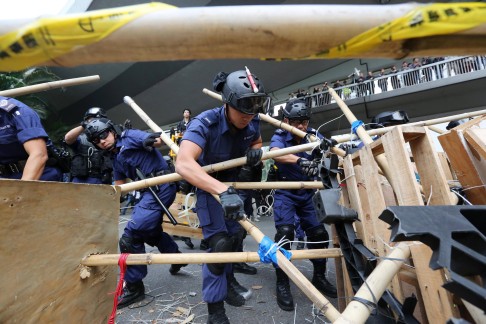

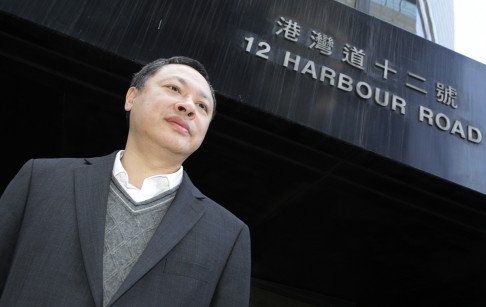



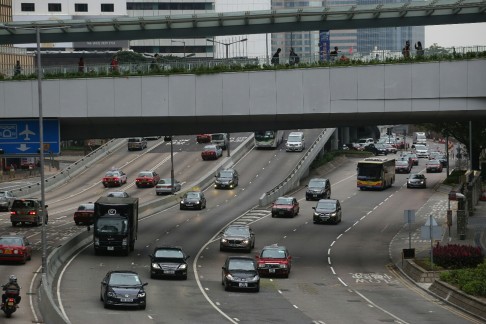
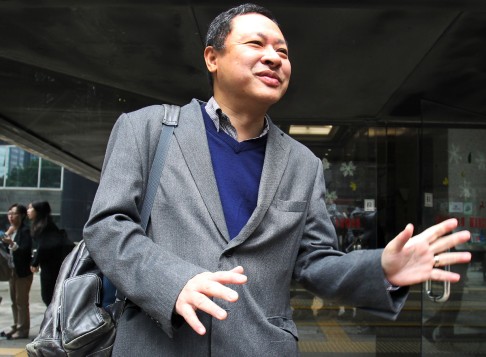
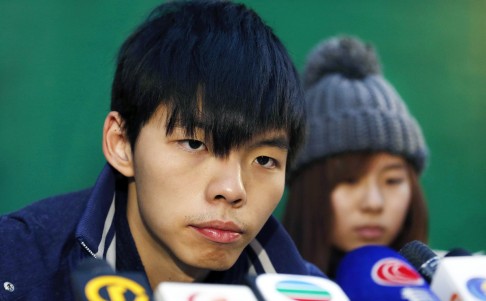

沒有留言:
張貼留言